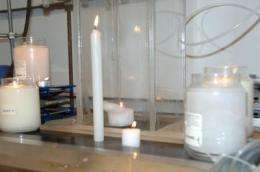Romantic, candle-lit dinners: An unrecognized source of indoor air pollution

Burning candles made from paraffin wax -- the most common kind used to infuse rooms with romantic ambiance, warmth, light, and fragrance -- is an unrecognized source of exposure to indoor air pollution, including the known human carcinogens, scientists reported here today. Levels can build up in closed rooms, and be reduced by ventilation, they indicated in a study presented at the 238th National Meeting of the American Chemical Society (ACS).
In the study, R. Massoudi Ph.D., and Amid Hamidi, his undergraduate student, said that that candles made from bee's wax or soy, although more expensive, apparently are healthier. They do not release potentially harmful amounts of indoor air pollutants while retaining all of the warmth, ambience and fragrance of paraffin candles (which are made from petroleum).
"An occasional paraffin candle and its emissions will not likely affect you," Hamidi said. "But lighting many paraffin candles every day for years or lighting them frequently in an un-ventilated bathroom around a tub, for example, may cause problems." Besides the more serious risks, he also suggested that some people who believe they have an indoor allergy or respiratory irritation may in fact actually be reacting to air pollutants from burning candles.
Source: American Chemical Society (news : web)
















